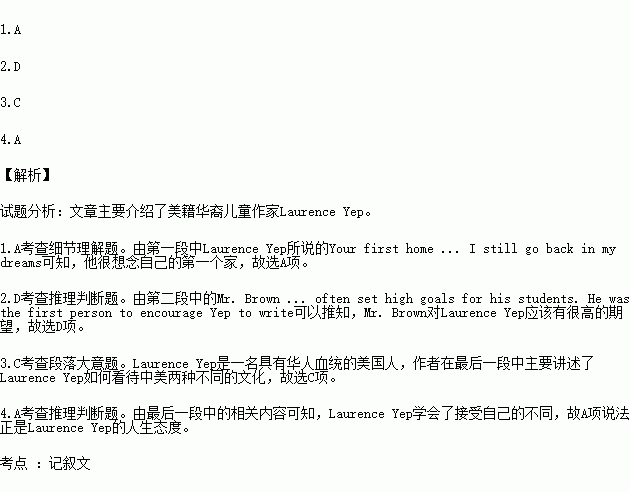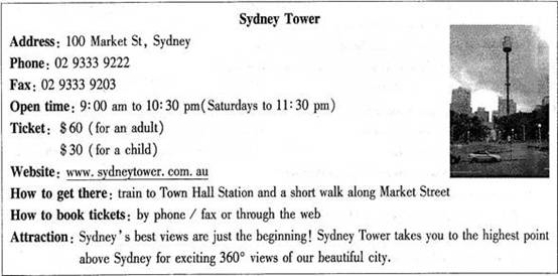题目内容
“Your first home,” Laurence Yep wrote in his book, The Lost Garden, “will always be the one that you remember best. I have been away from it for over twenty years, but I still go back in my dreams.” For Yep, whose father came from China, home was an apartment and the family grocery store in a neighborhood of San Francisco. It was there that he learned about patience, hard work, and getting along with neighbors.
Mr. Brown, Laurence Yep’s high school English teacher, often set high goals for his students. He was the first person to encourage Yep to write. The experience of that class changed the direction of Yep’s life. At the age of 18 Yep published his first short story, a sci-fi fantasy. He has since written many books and many kinds of books. He has retold Chinese folk stories and written for the theater. In nearly all these varied works, Yep, who is married to the children’s book author Joanne Ryder, has returned to questions he has been asking himself since childhood: What does it mean to be Chinese and American? Can one who belongs to two cultures ever feel at home anywhere?
When asked, “How has being of a Chinese by origin been important to you?” Laurence Yep replied, “As a child I wanted to be as American as possible. Then, in my early twenties, I became very interested in my Chinese roots. For years after that, I thought that my function as a Chinese American writer was to act as a bridge between two cultures. Now, though, I am not so sure that it is possible to join them together. Compared with Asian culture, American culture pays more attention to individuals and competition. The two cultures pull in opposite directions. So I see myself now as someone who will always be on the border between two cultures. That works to my benefit as a writer because not quite fitting in helps me be a better observer.”
1.According to Paragraph 1, Laurence Yep _____.
A. misses his first home very much
B. goes back to China from time to time
C. moved to San Francisco at an early age
D. once worked part-time at a grocery store
2.2We may infer from Paragraph 2 that Mr. Brown _____.
A. asked Laurence Yep to be a good observer
B. taught Laurence Yep the value of patience
C. helped Laurence Yep finish his first book
D. had high expectations of Laurence Yep
3.The last paragraph is mainly about Laurence Yep’s _____.
A. childhood memories
B. varied writing styles
C. view of the two cultures
D. relationship with his family
4.Which of the following best describes Laurence Yep’s attitude to life?
A. Learn to accept your own differences.
B. Put the needs of others ahead of your own.
C. Work hard and you will receive many benefits.
D. Challenge others as you would wish to be challenged.


